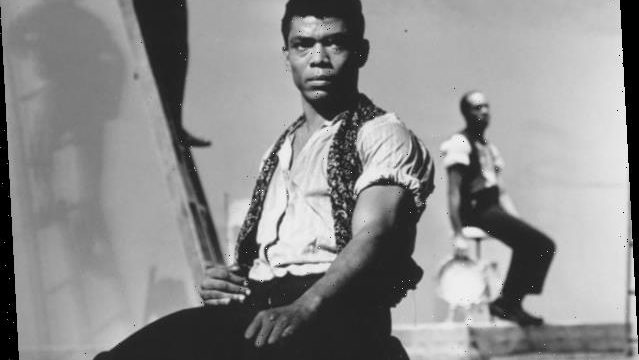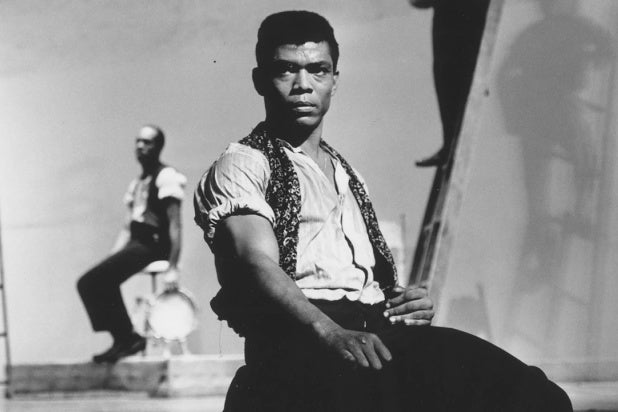Sundance 2021: Jamila Wignot’s portrait of the incomparable Alvin Ailey honors the work but remains mystified by the man
Jack Mitchell/Sundance Institute
A firm believer in what he called “blood memories,” everything that choreographer extraordinaire Alvin Ailey did, he charged with intentionality; the joy and pain of those before him influenced his artistry from the inside out. The American dance legend, a pioneer in making the Black experience part of the art form, gets a thorough and evocative documentary — if still veiled about his personal life — in director Jamila Wignot’s “Ailey,” premiering at the Sundance Film Festival.
Audio, and occasionally video, from interviews with Ailey chronicle his earliest years as child of the Great Depression in Texas. His hazy voice comes through as if narrating from the distant past. Illustrative footage from the time, even if not always portraying Ailey himself, places him as a part of a the greater stream of Black history in the United States. That commentary addresses his sexual orientation, but while there’s never an avoidance of the topic, the film also doesn’t delve into its relation to his identity or work.
Wignot frames the biographical content with the present, as choreographer Rennie Harris puts on a piece to celebrate the 60th anniversary of Ailey’s legendary dance company. In seeing today’s Black performers drawing on his creations and life story, we are offered a look into the future that honors the late Ailey’s legacy. Moving along in his timeline, we learn about his formative experience in Los Angeles, and how seeing Katherine Dunham, the first African-American he saw perform on a professional stage, encouraged to devote himself to the poetry of the body.
With Ailey having now served as vital inspiration for many others across decades, the film itself also plays as a testament to the life-changing power of representation. Truth in motion is what he was after, and in his expressive creations he communicated what he was unable to otherwise, from a tribute to his supportive mother, a coda for a dear friend that passed, or his anger at pervasive racism. Of all his staged presentations, the most seminal remains “Revelations,” a highly spiritual experience connecting his recollections from Black churches he attend growing up with a collective Black perspective as he perceived it.
The relevance and reach of Ailey’s career can’t be overstated, and Wignot ensures it gets its due recognition, while still engaging with questions of whether the artist was a token for the white establishment, which could pat itself on the back when championing his work without structurally promoting and nurturing other Black artists. Prolific like few others in his field, Ailey’s relatively rapid production schedule is explained, in part, as a race for validation, although the film hints, without getting into the particulars, at mental-health issues that took a toll on him.
Though Wignot populates the screen with first-hand testimony from those who danced for his company and accompanied him on the tours that took his vision to at least 44 countries in six continents, none attained access to his innermost mental chambers; thus, despite the amount of material on deck, Ailey as human being remains mostly enigmatic.
Close collaborator Judith Jamison speaks of his incredible skill at translating thoughts into the language of the limbs, but there’s a gap of missing depth that will probably never be bridged. Ailey didn’t have a romantic life partner, and so without having someone who knew him beneath the surface, who could speak at length about what he went through when the lights went down, this is as close as one can get to the man.
Caught between exalting the glory of his titanic accomplishments and their indelible mark on Black American culture, and figuring him out with only the available pieces of his intimate puzzle, “Ailey” does succeeds at painting him as a complex figure. To that end, one of Wignot’s smartest editing moves is to bookend the film with video from the 1988 Kennedy Center Honors where Ailey was celebrated for his lifetime contribution to American culture.
Even if Ronald Reagan taints the images, looking on while gay people were hopelessly dying during the AIDS crisis, it’s impossible not to marvel at Ailey’s transcendental prowess, rising from a humble upbringing in a segregated country to a standing ovation receiving one of that country’s highest civilian honors. Even if awarded by a hypocritical administration, as he was hiding his own losing fight with the disease, the recognition was inarguably deserved. To see the recently departed Cicely Tyson introduce Ailey only adds to the evening’s resonance as an icons-only moment for the ages.
Source: Read Full Article

